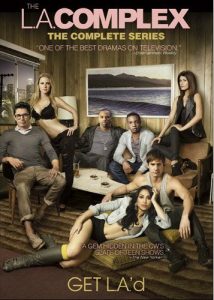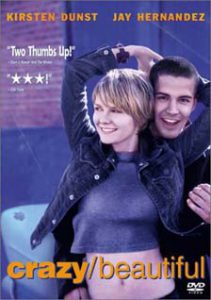“Crazy/Beautiful” (2001) is one of the elite entries in the subgenre of cute and rich teen girls being provocative to see what they can get away with. Director John Stockwell – as also seen in “Blue Crush” (2002) – has a knack for taking glamorous actors and actresses and dressing them down so they believably fit into the grimy real world, without sacrificing their charms.
Contrasting priorities
Written by Phil Hay and Matt Manfredi, this is a three-lead picture fronted by Kirsten Dunst, in one of a series of “This girl has some range!” roles in the late ’90s and early Aughts. She lurchingly but fascinatingly takes the spotlight as Nicole, a Congressman’s daughter who is suicidal and vaguely addicted to alcohol and drugs.
The well-meaning but confused-about-what-to-do men in her life are new beau Carlos (Jay Hernandez, later of “Magnum P.I.”) and dad Tom (Bruce Davison). As would later be seen in the glossier Hilary Duff showcase “According to Greta” (2009), “C/B” doesn’t have magic solutions for how to help a teen girl who seems to have a good life yet hates herself and the world.

“Crazy/Beautiful” (2001)
Director: John Stockwell
Writers: Phil Hay, Matt Manfredi
Stars: Kirsten Dunst, Jay Hernandez, Bruce Davison
To some degree Nicole has to help herself, or at least open herself up to the help of those who love her. Even though Stockwell’s film isn’t a laser-focused journey from illness to cure, the very frustration of “How do we help her?” drives and elevates the rather thin plot.
“C/B” maintains an earthy vibe, as if it’s a series of slice-of-life vignettes. The film starts with the contrast between Carlos, who has to get up before 6 a.m. to catch the bus to prestigious Pacific Palisades High, and Nicole, who recklessly rides to school in an open-topped Jeep. Nicole and enabling bestie Maddy (Taryn Manning, always great in these best friend roles) immediately plan to skip class upon screeching into a parking spot.
Beautiful music
“C/B” is a snapshot of 2001 in that it mentions the racial differences between white Nicole and brown Carlos, although the class divide is the bigger thing. Nicole says in her typical provocateur fashion: “He’d be thrilled I’m sleeping with you. A person of color in his daughter’s bed.”
A tastier of-the-time element is the delicious soundtrack, highlighted by needle-drops of David Gray’s “This Year’s Love” and Maren Ord’s “Perfect,” which truly is a perfect encapsulation of early millennial teens desperately hoping for happiness that’s just out of reach.
Two decades earlier, the interracial dating would be the point. Two decades later, it’s more of a cliché, or slightly outdated – although the fact that lower-class Carlos’ and rich Nicole’s worlds are so different will always be striking.

While a clash between Carlos’ football teammates and neighborhood friends in Pacific Palisades delivers the expected class-difference awkwardness, the film is particularly powerful when Carlos, Nicole and Maddy explore rundown East L.A. In guerilla-esque style, cinematographer Shane Hurlburt captures the ’hood in all its grunginess.
In one of many great sequences where the girls lead the uncomfortable but fascinated Carlos by an invisible leash, Nicole and Maddy sexily dance outside a taco stand – possibly with some unsavory people in the crowd.
Walking a line
The line between a harmless good time and a dangerous situation is palpable throughout “C/B” (especially when Nicole or Maddy are behind the wheel of a vehicle). And although it slightly glosses over true differences in daily life between the races – Carlos is pulled over for expired tags, rather than Driving While Brown – we’re always hyper-aware that Carlos has less margin for error than Nicole.
I like how that’s kind of a thematic fake-out. The most powerful scene actually comes between Davison and Dunst, with Tom’s low-key “I’m talking to my daughter” being the line that triggers tears. Ultimately in “Crazy/Beautiful,” the drugs and drinking and suicide notes are there if you want them, but really it’s a case for being present if you love someone.
Rather than undercutting the complex issues, the film’s simplicity is – crazily – one of its most beautiful traits.

